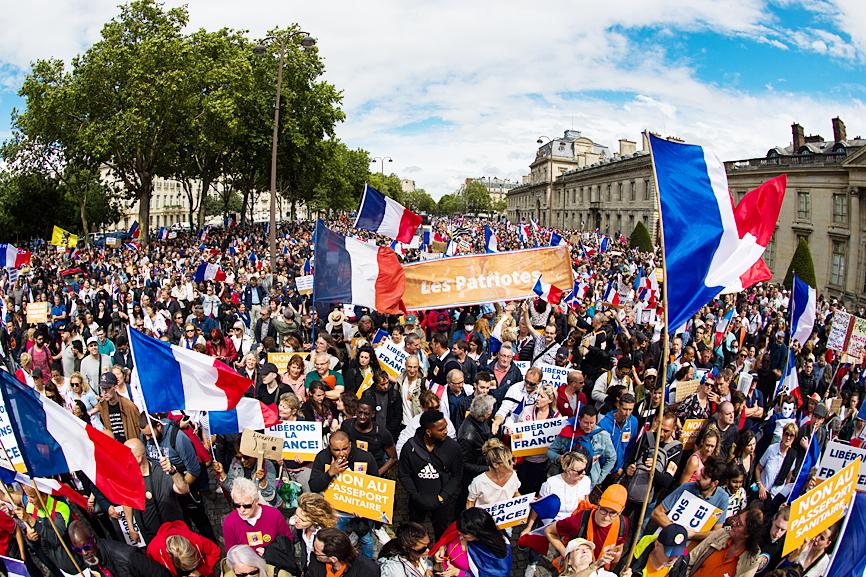Almost a quarter of a million people took to the streets across France on Saturday for the biggest protests yet against a COVID-19 health pass needed to enter a cafe or travel on an intercity train, two days before the new rules come into force.
Similar but smaller protests were held in Italy.
Championed by French President Emmanuel Macron, the regulations make it obligatory to have either a full course of vaccination against COVID-19, a negative test or be recently recovered from the virus to enjoy routine activities.

Photo: Bloomberg
Macron, who faces re-election next year, hopes to encourage all French to be vaccinated against COVID-19 and thereby defeat the virus and the fast-spreading Delta variant of SARS-CoV-2.
However, opponents — who have now held four weekends of consecutive protests — say that the rules encroach on civil liberties in a country where individual freedom is highly prized.
About 237,000 people turned out across France, including 17,000 in Paris, the French Ministry of the Interior said, exceeding the 204,000 recorded last weekend — unusual numbers for protests at the height of the summer break.
In one of several protests in Paris, hundreds marched from the western suburbs to the center, chanting “Freedom” and “Macron, we don’t want your pass.”
Wearing a mask, Alexandre Fourez, 34, said he was protesting for the first time and that he had himself recovered from COVID-19.
“The problem with the health pass is that our hand is being forced,” the marketing employee said, adding that he “really has difficulty believing its use will be temporary.”
At least 37,000 people protested in the Provence-Alpes-Cote d’Azur region on the Mediterranean coast in cities including Toulon, Nice and Marseille, officials said.
Slogans included: “The health pass means the death of freedoms.”
From today, the health pass is needed to eat in a restaurant or enjoy a drink at a cafe — indoors and on a terrace. It is obligatory on intercity transport, including high-speed trains and domestic flights, although not on metro systems and suburban transport.
The pass has already been required since July 21 to visit cultural venues such as cinemas, theaters and museums. Its extension was approved by the French Constitutional Council on Thursday.
In a slight easing of rules, French Minister of Health Oliver Veran on Saturday said that a COVID-19 test would be valid for the pass for three days instead of two.
Most of the protests were peaceful, but there were seven arrests in the southeastern city of Lyon for throwing projectiles, while in Dijon a tram line was blocked.
There were 35 arrests nationwide, the interior ministry said, adding that seven members of the security forces were lightly wounded.
Protests were held in a number of Italian cities against the introduction of new measures there requiring proof of COVID-19 status to attend indoor events and for teachers.
More than 1,000 people gathered in Piazza del Popolo in central Rome shouting “No Green Pass” and “Freedom.”
Thousands more marched in Milan.

CHAOS: Iranians took to the streets playing celebratory music after reports of Khamenei’s death on Saturday, while mourners also gathered in Tehran yesterday Iranian Supreme Leader Ayatollah Ali Khamenei was killed in a major attack on Iran launched by Israel and the US, throwing the future of the Islamic republic into doubt and raising the risk of regional instability. Iranian state television and the state-run IRNA news agency announced the 86-year-old’s death early yesterday. US President Donald Trump said it gave Iranians their “greatest chance” to “take back” their country. The announcements came after a joint US and Israeli aerial bombardment that targeted Iranian military and governmental sites. Trump said the “heavy and pinpoint bombing” would continue through the week or as long

TRUST: The KMT said it respected the US’ timing and considerations, and hoped it would continue to honor its commitments to helping Taiwan bolster its defenses and deterrence US President Donald Trump is delaying a multibillion-dollar arms sale to Taiwan to ensure his visit to Beijing is successful, a New York Times report said. The weapons sales package has stalled in the US Department of State, the report said, citing US officials it did not identify. The White House has told agencies not to push forward ahead of Trump’s meeting with Chinese President Xi Jinping (習近平), it said. The two last month held a phone call to discuss trade and geopolitical flashpoints ahead of the summit. Xi raised the Taiwan issue and urged the US to handle arms sales to

BIG SPENDERS: Foreign investors bought the most Taiwan equities since 2005, signaling confidence that an AI boom would continue to benefit chipmakers Taiwan Semiconductor Manufacturing Co’s (TSMC, 台積電) market capitalization swelled to US$2 trillion for the first time following a 4.25 percent rally in its American depositary receipts (ADR) overnight, putting the world’s biggest contract chipmaker sixth on the list of the world’s biggest companies by market capitalization, just behind Amazon.com Inc. The site CompaniesMarketcap.com ranked TSMC ahead of Saudi Aramco and Meta Platforms Inc. The Taiwanese company’s ADRs on Tuesday surged to US$385.75 on the New York Stock Exchange, as strong demand for artificial intelligence (AI) applications led to chip supply constraints and boost revenue growth to record-breaking levels. Each TSMC ADR represents

Pro-democracy media tycoon Jimmy Lai’s (黎智英) fraud conviction and prison sentence were yesterday overturned by a Hong Kong court, in a surprise legal decision that comes soon after Lai was jailed for 20 years on a separate national security charge. Judges Jeremy Poon (潘兆初), Anthea Pang (彭寶琴) and Derek Pang (彭偉昌) said in the judgement that they allowed the appeal from Lai, and another defendant in the case, to proceed, as a lower court judge had “erred.” “The Court of Appeal gave them leave to appeal against their conviction, allowed their appeals, quashed the convictions and set aside the sentences,” the judges